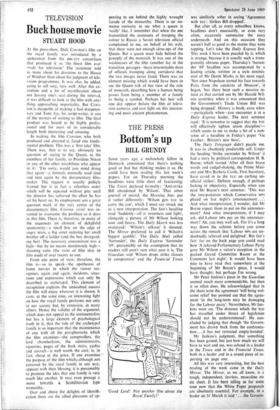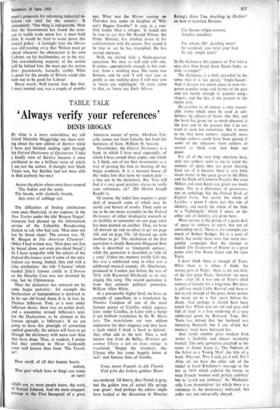Bottom's up
THE PRESS BILL GRUNDY
Some years ago, a melancholy fellow in Denmark announced that there's nothing good or bad but thinking makes it so. He could have been reading this last week's papers. For on Thursday morning the headlines were little short of fascinating. The Times declared formally: 'Anti-strike Bill abandoned by Wilson'. That other journal of record, the Morning Star, put it rather differently: 'Wilson gets TUC to carry the can', which I must say struck me as a new interpretation. The Sun's headline read 'Suddenly—all is sweetness and light', alongside a picture of Mr Wilson looking sour and heavy. The Daily Sketch was less overjoyed: Wilson's sell-out' it shouted. The Mirror preferred to call it 'Wilson's biggest gamble'. The Daily Mail yelled 'Surrender', the Daily Express 'Surrender '69', presumably on the assumption that its readers still aren't sure what year it is. The Guardian said 'Wilson drops strike clauses in compromise' and the Financial Times 'Good Lord! Not another film about the Royal Family!'
was similiarly sober in saying 'Agreement with -ruc : Strikes Bill dropped'.
But after all, as every schoolboy knows, headlines don't necessarily, or even very often, accurately summarise the story underneath. And on this occasion they weren't half as good as the stories they were topping. Let's take the Daily Express first.
This week I have been puzzled by it, which is strange, because it is usually such a trans- parently obvious paper. Thursday's 'Surren- der '69' headline was accompanied by a leading article, written in a style reminis- cent of Mr Derek Marks at his most regal.
'Not since Napoleon turned his face towards Paris from the outskirts of Moscow', it began, 'has there been such a massive re- treat as that carried out by Mr Harold Wil- son yesterday when it was announced that the Government's Trade Union Bill was being dropped'. History is bunk, even when —particularly when—you encounter it in a Daily Express leader. The next sentence
read: 'It is nonsense to suggest that the TUC will effectively tighten union discipline'—
which seems to me to make a bit of a non- sense of a headline in Friday's paper `Vic Feather: Britain's new boss'.
The Daily Telegraph didn't puzzle me. It was its absolutely predictable self. Under the heading 'Strike surrender by Wilson' it had a story by political correspondent H. B. Boyne, which started 'After all their brave words and cudgel-shaking, the Prime Mini-
ster and Mrs Barbara Castle, First Secretary, have caved in to the TUC on curbing un-
official strikes'. Definite enough, if perhaps lacking in objectivity. Especially when you read Mr Boyne's next sentence: 'This was
the interpretation which Conservative MPS
placed on last night's announcement ...'. And what interpretation, I wonder, did Mr Boyne expect them to put on the announce- ment? And what interpretation, if I may ask, did Labour mes put on the announce- ment? Ah, you may wall ask. For it's a long way down the column before you come across the remark that 'Labour tars are un- doubtedly relieved and delighted'. But fair's fair: for on the back page you could read how 'A relieved Parliamentary Labour Party gave Mr Wilson a victor's reception in the packed Grand Committee Room at the Commons last night'. It would have been nice to have read that somewhere at the beginning of Mr Boyne's piece, I would have thought; but perhaps I'm wrong.
Mr Peter Jenkins's piece in the Guardian seemed much more commendable, but then it so often does. He acknowledged that in the short term the agreement 'will bring wel- come relief' but pointed out that the agree- ment 'in the long-term may be damaging for the Labour party'. Nevertheless, Mr Jen- kins went on, 'The distance which the Tuc has travelled under threat of legislation should not be underestimated'. He con- cluded by judging that though 'the Govern- ment has drawn back from the confronta- tion ... it has not retreated empty-handed'. Mr Jenkins's judgment, that something has been gained, but just how much we will have to wait and see, was echoed in a leader in the Times and in the Financial Times, both in a leader and in a sound piece of re- porting on page one.
All this was very interesting, but the best reading of the week came in the Daily Mirror. The Mirror, as we all know, is a tough, independent, fearless, masculine etc etc sheet. It has been telling us for some time now that the White Paper proposals are absolutely essential. For example, in a leader on 31 March it said ' ... the Govern- ment's proposals for reforming industrial re- lations are vital for the country'. It announced: 'One thing is indisputable. Now that the Government has found the cour- age to tackle trade union law, it must hold firm. It would be fatal to water down this crucial policy'. A fortnight later the Mirror was still roaring away that 'Wilson must go ahead whatever the obstruction in his own Cabinet, on his backbenches, or in the 'rm. The overwhelming majority of the nation will be behind him. He must put the nation first: passionately, factually, visibly. What is good for the people of Britain could also turn out to be good for Labour'.
Brave words. Well roared, lion. But that, I must remind you, was a couple of months
ago. What was the Mirror roaring on Thursday last, under its headline of 'Wil- son's Biggest Gamble?' It said, in a roar little louder than a whisper, 'It would not be true to say that Mr Harold Wilson, the Prime Minister, has climbed down in his confrontation with the unions. Nor would it be true to say he has triumphed. He has moved sideways.
Well, we started with a Shakespearian quotation. We may as well end with one. It comes, appropriately enough in this con- text, from a working man. His name was Bottom, and he said 'I will roar you as gently as any sucking dove; I will roar you as 'twere any nightingale'. Or even, come to that, as 'twere any Daily Mirror.



































 Previous page
Previous page